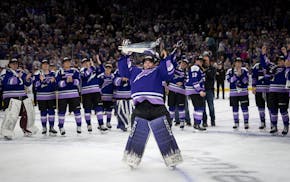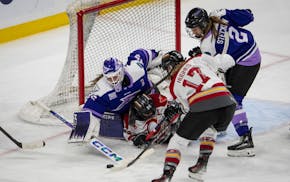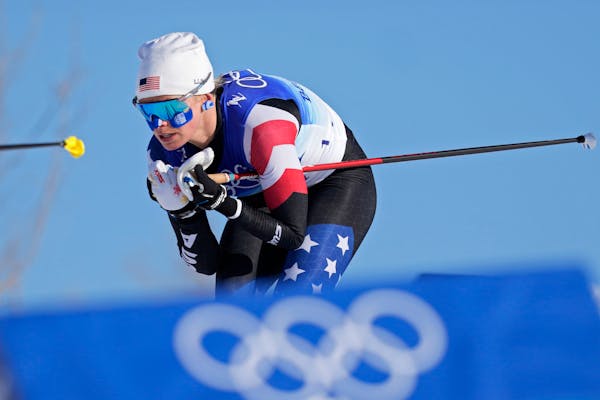BEIJING — The quarterfinal game between Team USA and Slovakia ended where no one wanted it to end Wednesday — with a shootout to determine who would advance to the medal round of the men's Olympic hockey tournament.
You know why? Those who have been involved say that losing a shootout doesn't feel like they have lost a game, which is hard to accept. So missing a chance to win an Olympic medal because of a shootout loss will likely sting for a very long time.
And that's where Team USA's ride came to an end at the National Indoor Stadium. It was 47.3 seconds away from a trip to the semifinals when Marek Hrivik poked in a rebound to tie the score at 2-2 and force a 10-minute 3-on-3 overtime. After neither team scored in overtime, the game went to a shootout. And now Team USA has exited the tournament in the quarterfinals for the second consecutive Olympics.
Only one goal was scored during the shootout, by Slovakia forward Peter Cehlarik, who beat USA goaltender Strauss Mann to his right. Mann thought he had the shot covered, but Cehlarik's quick release made the difference.
"You kind of dream about playing those games coming down to the end, whether it be 2-1 with a minute left or overtime, [or] shootout," said Mann, who made 34 saves in 70 minutes of play. "And I was just trying to seize the opportunity and felt pretty good but obviously didn't go how I wanted."
USA's Andy Miele had a chance to extend the shootout, but his attempt was thwarted by Patrik Rybar, sending Slovakia into delirium as Team USA's stunned silence said it all.
"It's kind of hard to put it in words right now because you think you have an opportunity to do great things here and, you know, you come up a little bit short," defenseman Steven Kampfer said. "So, it's a little disheartening."
Social media went bananas after the shootout, many wanting Michigan whiz Matty Beniers in the shootout. Beniers looked lively during the overtime period, getting a couple shots on goal and proving to be a handful. But Team USA coach David Quinn watches the team work on penalty shots during every practice and set his shooter lineup accordingly.
"We had a very good idea who we were going to pick," Quinn said.
The youngest team in the tournament played older for most of its run. The 15 college players on the roster — including from the Gophers, Minnesota Duluth, St. Cloud State and Minnesota State Mankato — acquitted themselves well, and their speed, skill and smarts earned them a bye into the quarterfinals. And several members of this team will be skating for their NHL clubs sooner than later.
The third period on Wednesday might have been the only stretch of the tournament where they looked like kids. Team USA needed a put-away goal but just couldn't produce one. Even when Slovakia started a parade to the penalty box, the U.S. wasted the power plays. That included a stretch of 1:37 in which it held a two-man advantage but struggled to get shots on net.
"It's really a vanilla period in a lot of ways," Quinn said. "We get the 5-on-3 and really that was the game-changer. I mean, when you've got a 5-on-3 and that scenario you don't capitalize on it, you're giving that other team a lot of hope, and they capitalized."
Slovakia led 1-0 after 17-year-old Juraj Slafkovsky — one of the best teenage hockey players in the world — got the puck with space in front of the net and buried a shot past Mann with 8:15 remaining in the first. Slovakia's forecheck was effective there, keeping the puck in the U.S. end while Slafkovsky got free. It was third consecutive game that Team USA had fallen behind early.
But there was a response, as Nick Abruzzese went forehand to backhand through Rybar's legs to tie the score with 45.7 seconds left in the first. Sam Hentges, not the Cleveland pitcher but the USA forward from New Brighton and St. Cloud State, scored with 11:04 to play in the second to break the tie.
The Americans had the lead but failed to add to it. They forced things at times, when playing simple and keeping the puck in Slovakia's end more might have paid off.
It was a crushing loss for a team that seemed to jell quickly and had a lot of talent. It also had seven players from Minnesota, with another two born elsewhere but playing at Minnesota colleges.
But one bad period can cost a team in a tournament. That bad period sent Team USA into overtime. Then to a shootout.
Then tumbling out of the Olympics.
"We were actually joking," Quinn said. "We still haven't lost a game, really. I mean, we lost a shootout, right?
"So that's the frustrating part."

Neal: Frost's PWHL title serves as a sweet topping to an outstanding final series

Neal: Frost goaltender Maddie Rooney stands tall — and stands up for her teammates on defense

Neal: Another season begins at Canterbury Park with Minnesota's sports betting future in limbo



